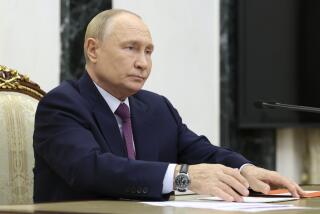Gorbachev Issues Warning on Sea Missile Deployment
- Share via
MOSCOW — Soviet leader Mikhail S. Gorbachev told an international peace group that any U.S. deployment of sea-launched cruise missiles would jeopardize negotiations between the superpowers on a 50% cut in strategic nuclear weapons, the Tass news agency reported Saturday.
Gorbachev also renewed his attack on President Reagan’s Strategic Defense Initiative and said that the Soviet Union would not go along with arms cuts that were immediately offset by introduction of new weapons.
Tass carried the text of Gorbachev’s remarks Friday to the new International Fund for the Survival of Humanity, a non-governmental foundation to promote peace and development.
Their publication came as Moscow and Washington resumed talks in Geneva on a 50% reduction in strategic nuclear arms. Gorbachev and President Reagan agreed at their Washington summit in December to try to complete work on such an agreement in time for signing during Reagan’s planned visit to the Soviet Union in late May or early June.
Glimpse of Differences
The Kremlin chief gave a glimpse of some of the differences aired at his summit talks with Reagan last month on new weapons and the Administration’s Strategic Defense Initiative, the so-called “Star Wars” system of space-based missile defense.
“At the Washington meeting we stated it point-blank,” Gorbachev said. “It is impossible to put an end to the arms race and really to pass over to the disarmament process if one of the partners at the talks has a feeling that the other side is trying to outwit him, that he is being outflanked.
“International relations cannot be built in this way,” he added. “It is important that the confidence that began to emerge . . . during the (Washington) talks should not be destroyed by the attempts of the opposite side to outwit the partner.” Gorbachev promised “new, constructive efforts” to promote nuclear disarmament and said a halving of Soviet and American strategic nuclear arsenals was a “realistic” possibility.
“However, we are resolute opponents of a situation under which some people start pushing the arms race in other directions . . . when the disarmament process is assuming real forms,” he added.
‘Isn’t It Silly?’
Once the treaty to abolish ground-launched intermediate-range nuclear forces was signed, Gorbachev said, proposals immediately emerged to strengthen navy and air force units. “Isn’t it silly?” he asked.
“If we cut strategic offensive weapons by 50% and continue moving toward further cuts, the following question arises: “What’s the need for attempts to bypass this process by deploying sea-based cruise missiles?
“We categorically oppose it.”
In his obvious references to the “Star Wars” plan that Reagan said might someday provide a defense against ballistic missile attacks, Gorbachev took a similar approach.
“If the arms race spreads to outer space, it would mean destabilization, and this is why it’s impossible to agree to it in principle,” he declared.
Moscow has argued that deployment of a missile defense system in space could give the United States a first strike capability.
Gorbachev said it took tremendous effort to work out the intermediate nuclear forces treaty that he and the President signed last month.
“It is impossible to go on with disarmament in some spheres and to step up the arms race in others,” he concluded.
On a more conciliatory note, Gorbachev said he was sure that the elimination of chemical weapons could be achieved in the “near future,” although he gave no date.
Responding to widespread fears about superior Soviet ground forces in Europe, Gorbachev said that Moscow is ready to “regard with understanding concern” the issue of conventional forces.
More to Read
Sign up for Essential California
The most important California stories and recommendations in your inbox every morning.
You may occasionally receive promotional content from the Los Angeles Times.













